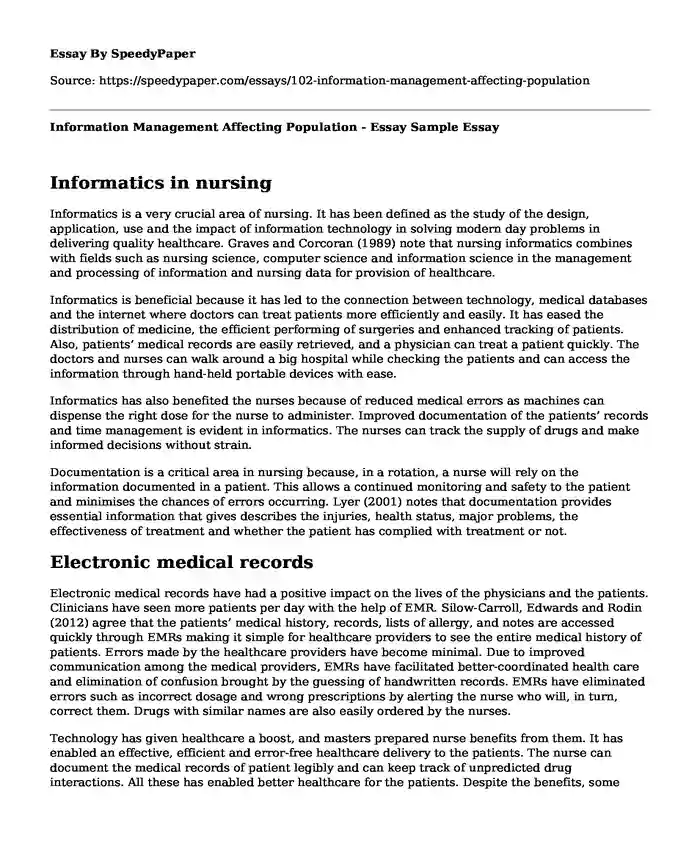
| Type of paper: | Essay |
| Categories: | Management Nursing Information technologies Technology |
| Pages: | 3 |
| Wordcount: | 708 words |
Informatics in nursing
Informatics is a very crucial area of nursing. It has been defined as the study of the design, application, use and the impact of information technology in solving modern day problems in delivering quality healthcare. Graves and Corcoran (1989) note that nursing informatics combines with fields such as nursing science, computer science and information science in the management and processing of information and nursing data for provision of healthcare.
Informatics is beneficial because it has led to the connection between technology, medical databases and the internet where doctors can treat patients more efficiently and easily. It has eased the distribution of medicine, the efficient performing of surgeries and enhanced tracking of patients. Also, patients’ medical records are easily retrieved, and a physician can treat a patient quickly. The doctors and nurses can walk around a big hospital while checking the patients and can access the information through hand-held portable devices with ease.
Informatics has also benefited the nurses because of reduced medical errors as machines can dispense the right dose for the nurse to administer. Improved documentation of the patients’ records and time management is evident in informatics. The nurses can track the supply of drugs and make informed decisions without strain.
Documentation is a critical area in nursing because, in a rotation, a nurse will rely on the information documented in a patient. This allows a continued monitoring and safety to the patient and minimises the chances of errors occurring. Lyer (2001) notes that documentation provides essential information that gives describes the injuries, health status, major problems, the effectiveness of treatment and whether the patient has complied with treatment or not.
Electronic medical records
Electronic medical records have had a positive impact on the lives of the physicians and the patients. Clinicians have seen more patients per day with the help of EMR. Silow-Carroll, Edwards and Rodin (2012) agree that the patients’ medical history, records, lists of allergy, and notes are accessed quickly through EMRs making it simple for healthcare providers to see the entire medical history of patients. Errors made by the healthcare providers have become minimal. Due to improved communication among the medical providers, EMRs have facilitated better-coordinated health care and elimination of confusion brought by the guessing of handwritten records. EMRs have eliminated errors such as incorrect dosage and wrong prescriptions by alerting the nurse who will, in turn, correct them. Drugs with similar names are also easily ordered by the nurses.
Technology has given healthcare a boost, and masters prepared nurse benefits from them. It has enabled an effective, efficient and error-free healthcare delivery to the patients. The nurse can document the medical records of patient legibly and can keep track of unpredicted drug interactions. All these has enabled better healthcare for the patients. Despite the benefits, some challenges come with healthcare technology. Healthcare providers are not well equipped to handle serious data breaches and cyber attack which leads to the loss of patients’ information. Also, when there are modifications to be made to one part of the system, the whole system is affected, and the masters prepared nurse will not access the patients’ data. Also, technology poses a safety challenge if the users are inadequately trained. Sometimes even the most competent nurses may encounter problems with new equipment, especially when under pressure to perform.
Heath informatics technology involves the applications of computers and technology in a healthcare setting which impacts positively on the health outcomes of individuals. It has assisted in the rapid exchange of information, global partnership and the early detection and prevention of disease outbreak. Healthcare providers can easily share the outcomes of investigations of a disease and pass the information to other providers as a form of warning and early preparedness for a possible outbreak. This will reduce the chances of a disease spreading to the entire population.
References
Graves, J. R., & Corcoran, S. (1989). The study of nursing informatics. Image: the journal of nursing scholarship, 21(4), 227-231.
Iyer, P. W. (Ed.). (2001). Nursing malpractice. Lawyers & Judges Publishing Company.
Silow-Carroll, S., Edwards, J. N., & Rodin, D. (2012). Using electronic health records to improve quality and efficiency: the experiences of leading hospitals. Issue Brief (Commonw Fund), 17, 1-40.
Cite this page
Information Management Affecting Population - Essay Sample. (2018, Feb 23). Retrieved from https://speedypaper.net/essays/102-information-management-affecting-population
Request Removal
If you are the original author of this essay and no longer wish to have it published on the SpeedyPaper website, please click below to request its removal:
- Why Children Talk to Themselves - Free Essay Sample
- Aristotle Response to the Article.Philosophy Essay Example.
- Nursing Essay Example: Anxiety and Medication Errors
- Craft Essay Example: Glossary of Chain Accidents by Temim Fruchter
- Free Essay on How the Book The Constitution Cafe Changed My Views on Our Constitution and Government
- Free Essay with a Review of the Article '5 Workforce Management Strategies to Boost Employee Engagement'
- Essay Sample on Stress in Children Aged 3-12 Years
Popular categories




